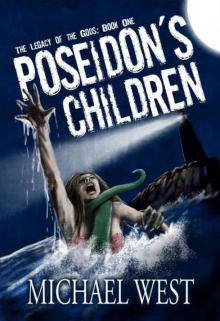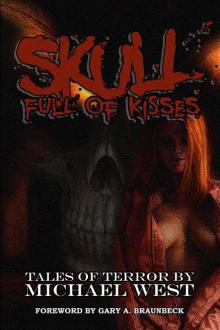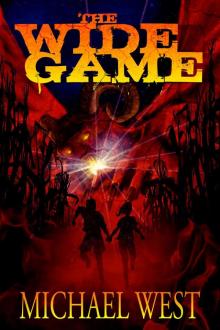- Home
- Michael West
Poseidon’s Children Page 10
Poseidon’s Children Read online
Page 10
“They have a doctor — he has the same office the town doctor’s had for more than a hundred years — but it’s what we like to call a ‘Band-Aid Station.’ He can treat minor injuries and illnesses, administer first aid, but, if a tourist gets in a car crash or a boating accident, Black Harbor Medical Center is better equipped to handle such emergencies.”
“What about the townspeople?”
“Excuse me?”
“Somebody needs an appendix out, they have to come out here for the surgery?”
Brahm blinked, then shrugged and said, “I suppose so.”
Larry shook his head and looked through the small window in Peggy’s door. She was sleeping. “What kind of animal could do that, Doc?”
“I can’t be certain. We have several varieties of sharks in these waters that —”
“Sharks?” Larry’s gaze snapped from the window. “What do sharks have to do with this?”
“I’m afraid I don’t follow you?”
“Peggy was attacked in an alley. She was bitten on dry land.”
Larry’s confusion spread to the doctor. “Mr. Neuhaus, I’ve seen shark attack victims before, and this bite is characteristic of such an attack. The —”
“I don’t care what it’s characteristic of, she wasn’t in the water. She was a hundred yards from the beach. I’d just talked to her on the phone at the library. Look at her hair, at the clothes she was wearing when they brought her in. They’re bloody, but other than that, they’re dry as a bone.”
Brahm stared at him a moment, then scribbled something in Peggy’s chart and said, “Shark or not, she was mauled. With that in mind, her wounds have been washed and thoroughly cleaned. I’ve already had some blood work ordered on her, a CBC and a tox screen —”
“Shouldn’t you...I don’t know...give her rabies shots, in case it was a pit bull or something?”
“We don’t want to treat a condition she doesn’t have, especially in her weakened state.” Brahm capped his pen and slid it into the breast pocket of his dark-blue scrub jacket. “I treated a three-year-old a few years back who was mauled by a Dalmatian. She loved the Disney movie and the parents bought her the dog before checking into the facts about their nature. This just isn’t a dog bite. These teeth were clearly serrated. And the size of the punctures, each was nearly an inch wide and deep...If it’s not a shark, I honestly don’t know what it could’ve been.”
Larry frowned. The only thing he cared about now was getting Peggy well. He wanted to take her from this hospital as soon as possible and leave Colonial Bay.
Brahm put a hand on Larry’s shoulder. “I know you’re concerned about her. Hell, I’d be out of my mind too if it were my wife lying there, but it looks like she is out of the woods.”
As he looked at Peggy, tethered to machines and an IV, Larry had a different feeling.
TWENTY THREE
Barbara DeParle sprinted for Colonial Bay’s church. The building was centuries old, but showed no signs of its age. The other town elders had spared no expense to maintain it. All that work and expense always seemed silly to Barbara. After all, the church, with its ornate stained glass and solid oak pews, had never been used. Like a house built on a Hollywood back lot, it was real only for cameras and tourists.
What was the old saying? Religion has made an honest woman of the supernatural.
The large doors were made of thick, heavy wood, but the old woman pushed them open with ease. She rushed into the pitch-black interior, hurried past unlit candles surrounding the marble altar. Barbara didn’t need them. She saw perfectly well in the dark.
To the right was a slender door. She pushed it open, descended stone steps two at a time, hoping she wouldn’t slip and tumble the remainder of the way down. The cramped staircase gave way to a vast temple; flickering candlelight offered warm, reverent illumination denied to the altar above. Barbara ran to the mammoth statue at the center of the chamber and fell to her knees.
“Varuna,” she cried, “hear my prayers!”
She babbled on in the ancient tongue, a dead language that was father to all others. She spoke of her missing Christine, confessed her fear of Tellstrom, and then she told her god of Peggy Hern.
Word spread quickly through Colonial Bay that a woman had been attacked, been bitten, and lived.
Barbara wished Peggy dead, then felt guilty for it. What was done was done. Varuna had a purpose for everything, even Karl Tellstrom; as priestess to the town, and to all of Poseidon’s children, it was Barbara’s job to divine what that purpose was and then act to further it.
She knelt beneath the effigy, peered into its sculpted eyes. Its face, the down-turned snout of a shark, normally provided her great solace, but there would be no consolation tonight.
Barbara felt her world coming apart.
As she continued her chant, she found a trident chiseled into the statue’s pedestal. She traced it with her aged finger, coaxed a spectral light from the stone. The glow did nothing to quiet the commotion; a thousand thoughts buzzed around her brain, each coming to the same conclusion: Barbara had to see Peggy.
TWENTY FOUR
Roger Hays entered Black Harbor Medical Center’s morgue. He noticed three things immediately; first, the room stank of disinfectant, as if someone had recently doused it in a valiant attempt to cover a much darker stench; second, a stainless-steel table adorned with gutters, and, resting on said table, the shrouded contour of a corpse; and the final point of interest, a lab-coated gentleman seated at a desk on the other side of the room. The man ate a sandwich as he watched an episode of COPS on a small television. How anyone could dine in the same room where autopsies were performed was beyond Roger’s understanding.
Hays cleared his throat.
The lab-coated man looked up. “Can I help you?”
“I’m Roger Hays. I’m here for my son.”
The man wiped his lips with a napkin, then shut off his TV and grabbed a clipboard from a nail above his desk. He met Hays at the edge of the table, scanning the paperwork. “I’m sorry for your loss. We just need you to fill out these forms. They have a place to list the mortuary where you’ll be —”
“Is this him?” Roger indicated the sheeted cadaver on the table between them.
“N-No.”
“May I see my son?” The young man regarded him as if he’d grown a third eye; Roger frowned. “Is there something unusual in the request?”
“No, it’s just that I...I really don’t think you want to do that.”
“Yes, I really do.”
“Sir, I don’t mean to sound insensitive, but...half his face is gone. We had to identify him based solely on dental records. I don’t think you want to remember him —”
“I appreciate your concern.” This man was trying to dissuade Hays because he did not want to see an outbreak of wailing grief, or to clean vomit off his floor. There was no danger of either. “Now, will you honor my request, or do I need to call the hospital administrator?”
After a moment’s hesitation, the attendant crossed the room to a stainless-steel wall of drawers, each marked with a number, like lockers at a health club. He checked his clipboard, then opened the proper cabinet.
Number 20, Roger noticed, same as David’s age.
A light fog drifted from the opening, lowering the temperature of the room. The attendant reached in and pulled out the long, metal shelf on which Hays’ son lay. Like the body on the table in the center of the room, David had been tucked in snugly with a white sheet.
Roger surveyed the cloth, preparing his mind for what lay beneath. Where the hill of an arm ought to have been, the linen cascaded directly off the torso. Where David’s washboard stomach and muscular chest should have pushed at the shroud, the fabric formed sinkholes. Roger felt numbness creep through his body.
“Have you ever seen a shark attack victim, Mr. Hays?” the lab-coated man asked.
Roger shook his head. He’d seen many gruesome sights in his time. People in organized crime ge
t an education fairly quickly. But, to his recollection, he’d never seen a shark’s leftovers.
The attendant cleared his throat. “You’re going to see —”
Hays reached out and pulled back the sheet. His son stared up at him with a single glazed eye. Upper teeth attempted a smile, but their lower mates had been ripped away with the jawbone. It was hard to believe this thing had once been human.
Roger felt grief well up in him, but he kept it at bay. If Komarovsky had done this to his boy, Hays would pay him back with interest, but he had to be sure. He cleared his throat. “You’re certain it was a shark?”
The man flashed Roger a questioning stare, then flipped through the pages on his clipboard and nodded. “Several sharks, actually.”
“Several?”
“Yes. The M.E. states there are at least three distinct bite patterns.”
“You didn’t perform the autopsy?”
“No, sir.”
“Are you the coroner, or the night watchman?”
The man straightened his posture. “I’m one of the Medical Examiners on staff, sir. I’m just not the one who examined your son.”
“How much do you know about shark attacks? Have you actually seen one?”
“Yes, sir.”
Roger looked the man squarely in the eye. “I take it you know who I am?”
“Of course.”
“As you might imagine, men in my position receive death threats from time to time, threats that are also aimed at our families. I need you to look at my son and confirm what’s in that report. I need you to tell me, without a doubt, that it was a shark.”
The man said nothing. His gaze alternated between Roger and the clipboard in his hand, then, either to humor a grieving father, or because he feared Roger’s reputation, he put down the report and studied David’s remains. “That’s odd.”
“What?”
The man hesitated, but Roger’s cold stare urged an answer. “The skin appears to have been gnawed off the bone. Sharks bite down with up to 900 pounds of pressure; think of a fully loaded pick-up pressing down on a row of steak knives. They can also swim at speeds of twenty-five miles an hour, which means they hit their prey like a freight train. The force of this impact and the pressure of the jaw will inflict what we call a crush injury, massive bruising and bone fractures. Once they have something in their mouths, they thrash their heads around in the water, tearing away entire sections of the carcass. The way the arm is torn away is totally consistent with this type of attack. But...”
“Yes?” Roger pressed.
“Your son’s ribs are still intact.” He pointed down at the gaping hole in David’s abdomen, then to what was left of his face. “And, even though his jawbone is missing, the rest of the skull is undamaged.”
“What about his missing eye?”
“A crab may have taken that.”
“A crab?”
“There are marks in the remaining flesh around the socket that suggest it was clawed out.”
“Clawed, or gouged?”
“Well, either way, it was done post-mortem. And, obviously, the sharks didn’t do it.”
No, but a man might have.
Hays allowed his eyes to fall back to David’s savaged form, still searching for a whisper of Komarovsky. He saw long scratches on his son’s shoulders and pointed them out to the examiner. “And these? Did a crab do these?”
The man gave these wounds a cursory study. “They’re not deep enough to have been a contributing factor in his death. They could be anything. The body was probably raked across the reef by the tides.”
“He wasn’t scratched by whatever killed him?”
“Sharks don’t have claws, Mr. Hays.”
“And you’re still certain sharks did this to him?”
The examiner regarded him evenly. “I’m no expert on sea life, but I’d be hard-pressed to think of another animal with a bite radius this large...and the wounds were made by flat teeth with serrated edges, like those of a shark.
“I’m sure you’ve seen news reports in recent years, sharks schooling off the coast. No one knows why. An area can go years and years with no activity, then things heat up again. In fact, we just had a woman brought into the hospital this evening after an attack.”
Roger’s head did a bird-like twitch. “Did she survive?”
“She was alive when they brought her in.”
Hays needed to find this woman, needed to see if she had the same mysterious injuries. He had to know who or what had stolen his son from him. Roger concealed what was left of David with the sheet.
Good-bye.
He placed his hand on the body’s veiled forehead, then his eyes rose to meet the examiner’s. “Where did they take her?”
•••
Larry stood outside Peggy’s room, watched her sleeping form through the rectangular glass in her door. A nurse checked monitors and made notes, assuring him her condition remained unchanged. He took another drink of his coffee, surprised to find it tasted more like Starbucks than mud. Larry was afraid to sleep, afraid that something might change for the worse and he’d be caught unaware.
A somber figure approached, an older man, wearing what appeared to be an Armani suit.
At first, Larry thought it was an administrator, then he realized the time. It was now after midnight. The desk jockeys had more than likely gone home, leaving the work of medicine to the practitioners. There was anger in this man’s face and...something else, something Larry couldn’t put his finger on.
When the stranger noticed that he was being watched, his face lightened, banishing the dark trait before it could adequately be defined. “Excuse me.” He pointed to Peggy’s room. “Is this the shark attack victim from earlier this evening?”
Larry was unsure of how to reply, or even if he should reply. “She was attacked. The doctor said it was a shark, but it had to have been something else.”
The man perked up. “Such as?”
“I’m sorry if this sounds rude, but...who the hell are you?”
The man extended his hand. “Roger Hays.”
Larry reluctantly shook it, his face puzzled. The name was familiar, but he didn’t know why.
“My son died in a shark attack two nights ago,” Roger explained. “I just wanted to see if this young lady was all right.”
The bewilderment left Larry’s eyes. Perhaps that justified the dark expression he’d seen earlier. If he’d been told that Peggy had just been killed...well, he’d probably have had another seven years bad luck. “I’m sorry about your son.”
“Yes.” The man’s tone turned interrogative. “I understand that you may have witnessed the attack.”
Larry shook his head. “Sorry. I saw an attack on a woman.”
“Could you describe her to me?”
“I don’t see what this —”
Roger raised a hand to silence him. “Please.”
Larry looked at the fluorescent fixture in the ceiling, trying to recall the screaming face he’d seen for but an instant, fighting to separate it from the nagging image of the rotting corpse in his dream. “She was young...long hair...I only saw her for a second.”
Hays regarded him with great interest. “My son sent me a picture of himself and his girlfriend of the moment.” He produced an iPhone, found the right picture, and handed it to the artist.
Larry had never seen the young man in the Stanley University sweatshirt, but the woman...he recognized her. She’d been a beautiful girl. He stared at the screen for a few moments, trying to burn the image into his mind’s eye, to replace the dead woman with this living one.
Hays stood by silently, watching him, waiting impatiently for him to speak.
“That’s her,” Larry finally croaked.
Hays nodded as if he’d known the answer all along.
“I tried to...” Larry swallowed. “What was her name?”
“Susan. Susan Rogers.”
Larry felt a sudden chill; he shuddered.
>
Hays appeared not to notice. “Did you see the shark?”
Larry shrugged. He’d aimed his flashlight into the water, saw a silhouette below the waves, but he hadn’t known what it was until that dorsal fin broke the surface. “I saw a shape in the water...a fin...it —”
“Was it a shark, or was it something else?”
“I couldn’t pick the thing out of a lineup for you, if that’s what you’re asking. I thought it was a shark, yes, but it could’ve been some other animal... Look, not to be rude again, but it might save us both some time if you told me what you’re looking for.”
“I’m trying to find out what killed my son. I assume you’ve seen pictures of a shark before. Did what you saw, this shape, did it look like one?”
“It looked like...wait...” Larry suddenly remembered his first opinion. “To tell you the truth, before I saw the fin, I thought it was a man down there with her.”
“A man? Are you sure?”
“I thought so, but obviously it wasn’t...I mean...no one came out of the water, and I saw the wounds —” Hays offered him an odd glance, and Larry realized he’d seen Susan’s body only in a dream. He pointed to the door. “— Peggy’s wounds. No man could do that.”
Hays whispered something that sounded Russian; the darkness returned to his face, and he said, “You’d be surprised at what a man can do.”
TWENTY FIVE
A perfect New England night; the air was cool and the sky clear, so clear in fact that every star seemed visible to the naked eye. A full moon hung over Colonial Bay’s school, making it easy for the clans of Poseidon to find their way into the building.
Christine stood by the diving board, watching Karl Tellstrom smile and greet each member by name as they entered the pool chamber. Erik and Melody Jones, the editors of Colonial Bay’s newspaper, were among them. So was Mike Richards, owner of the bait shop by the docks. Karl could not hide his surprise, his joy. A week ago, this was to have been a small group, but word seemed to have spread to half the town. The discovery of Atlantis was the key. Karl told them it was a sign, that it was time for them to stop living a lie. Some believed him immediately, others took longer to convince, still others would never believe.

 Poseidon’s Children
Poseidon’s Children Vampires Don't Sparkle!
Vampires Don't Sparkle! Skull Full of Kisses
Skull Full of Kisses The Wide Game
The Wide Game Cinema of Shadows
Cinema of Shadows